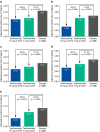Teriflunomide reduces relapses with sequelae and relapses leading to hospitalizations: results from the TOWER study
- PMID: 24972678
- PMCID: PMC4155167
- DOI: 10.1007/s00415-014-7395-7
Teriflunomide reduces relapses with sequelae and relapses leading to hospitalizations: results from the TOWER study
Abstract
Teriflunomide is a once-daily oral immunomodulator approved for the treatment of relapsing-remitting multiple sclerosis. This post hoc analysis of the Phase III TOWER study evaluated the effects of teriflunomide treatment on five severe relapse outcomes: relapses with sequelae defined by an increase in Expanded Disability Status Scale (EDSS)/functional system (FS) score (sequelae-EDSS/FS) 30 days post relapse; relapses with sequelae defined by the investigator (sequelae-investigator); relapses leading to hospitalization; relapses treated with intravenous corticosteroids; and intense relapses using the definition of Panitch et al. from the EVIDENCE study based on specified increases in EDSS for severe relapses. Adjusted annualized rates for the five severe relapse outcomes were derived using a Poisson model with robust error variance, with treatment, baseline EDSS strata and region as covariates. Compared with placebo, teriflunomide significantly reduced annualized rates of relapses with sequelae-EDSS/FS [14 mg, 36.6 % (p = 0.0021); 7 mg, 31.3 % (p = 0.0104)] and sequelae-investigator [14 mg only, 53.5 % (p = 0.0004)], relapses leading to hospitalization [14 mg only, 33.6 % (p = 0.0155)], relapses requiring intravenous corticosteroids [14 mg, 35.7 % (p = 0.0002); 7 mg, 21.5 % (p = 0.0337)], and intense relapses [14 mg only, 52.5 % (p = 0.0015)]. Patients treated with teriflunomide 14 mg spent significantly fewer nights in hospital for relapse (p = 0.009) and had lower annualized rates of all hospitalizations (p = 0.030). Taken together, the positive effects of teriflunomide on severe relapses indicate that teriflunomide may reduce relapse-related healthcare costs.
Figures


References
Publication types
MeSH terms
Substances
LinkOut - more resources
Full Text Sources
Other Literature Sources

